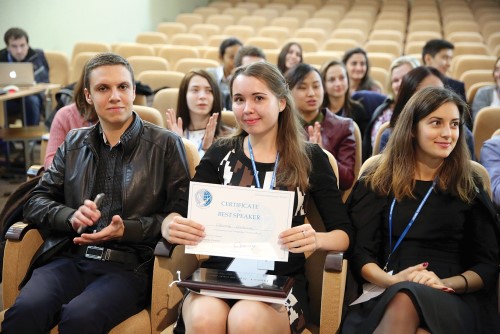
Participants and prize winners of the competition
Events of the past few years show that armed conflicts can occur unexpectedly and nearby. We need only look to Ukraine. Perhaps this is why students from Kiev’s Taras Shevchenko National University did well at the International Youth for Peace Law Competition, having first-hand knowledge of war. It will soon be three years since conflict began in the southeast of their country. Who else but lawyers, even future lawyers, should know that provisions of law must be used to solve disputes, and solve acute issues.
The MITSO Games requires the application of theoretical knowledge to resolve conflicts. This year, teams were asked to negotiate for the repatriation of prisoners of war from one state to another.
The Head of the Chair of International Law at the International MITSO University, Doctor of Legal Sciences Yelena Dovgan, tells us, “The Taras Shevchenko National University of Kiev team (from Ukraine) and students from the Nicolae Titulescu University (Romania) coped well with the task, but those from Ukraine were most convincing.”
The jury found difficulty in judging the oratorical competition, but eventually selected the team from the Russian-Armenian (Slavic) University (Armenia), from the National Research University Higher School of Economics (Russia) and from the Taras Shevchenko National University of Kiev (Ukraine).
In total, representatives of 13 countries took part, including from China, Russia, Ukraine, Armenia, Romania, Poland, Moldova, and Kyrgyzstan. Two MITSO teams represented Belarus, but did not take part in any of the contests, to avoid the possibility of biased judging.
The jury comprised leading foreign experts of international law: Prof. Stefan Oeter, of Hamburg University (Germany); lawyer Lionel Blackman, from the UK; Olivier Ribbelink, a senior researcher at the T.M.C. Asser Institute (Netherlands); Prof. Michael Strauss, of the Centre for Diplomatic and Strategic Studies (France); and Prof. David Turns, from Cranfield University (UK).
At the press conference held prior to the competition, Olivier Ribbelink noted that the International Youth for Peace Law Competition is among the three most prestigious European competitions for international law. Participation is important for future lawyers, giving students practical experience of negotiating, learning to defend their interests before a large attendance, and gaining in confidence. Summing-up the results of the competition, Romanian team member Marius Brabete admitted, “Of course, it’s a pity that my team took second place, but we came close to victory. Most importantly, we took part. I hope we’ll keep in touch by phone with our colleague-friends in Minsk and will return again.”
Organisers note that the competition fosters a friendly atmosphere of support. Yelena Dovgan notes, “Evenings of national culture helped unite the young people, despite their different backgrounds. They were able to become acquainted, making mini-presentations on culture and their national traditions.” Dishes of national cuisine were also available on these evenings. Mr. Brabete admitted that he liked Ukrainian curd tarts, Kyrgyz dumplings and, of course, Belarusian draniki.
By tradition, participants of the competition tour Minsk and always profess a liking for the city. Prizes were also awarded for the best essays on international humanitarian law, honouring the 70th anniversary of the end of the Second World War.
МТ REFERENCE:
The International Youth for Peace Law Competition is a unique project, without analogue in Eastern Europe or the CIS. Initiated by the International MITSO University, and co-organised by the Federation of Trade Unions of Belarus, the competition is part of a global initiative by the UN Academic Impact.
By Yekaterina Medvedskaya











